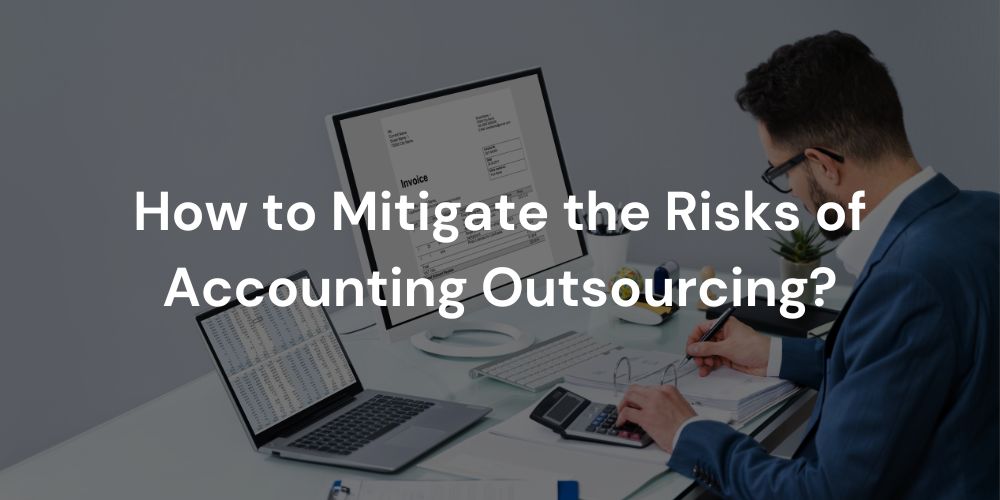How to Mitigate the Risks of Accounting Outsourcing?


In today’s fast-paced business environment, organizations often turn to outsourcing to streamline operations, reduce costs, and focus on core competencies. Accounting outsourcing has gained significant popularity due to its potential benefits, including improved efficiency, access to specialized expertise, and reduced overheads. However, like any business decision, outsourcing accounting functions carries inherent risks. Organizations must proactively identify and mitigate these risks to ensure a successful outsourcing venture.
This article will explore key strategies and best practices to avoid potential pitfalls when outsourcing accounting processes.
Read more: Latest Accounting Trends in 2023 | Future in Accounting
Understanding the Risks of Accounting Outsourcing
Before delving into risk mitigation strategies, it is essential to comprehend the potential risks associated with accounting outsourcing. These risks include:
- Data Security and Confidentiality: Outsourcing accounting processes involves sharing sensitive financial information with a third-party vendor and raising concerns about data breaches, unauthorized access, or compromised confidentiality.
- Quality and Accuracy: Handing over critical accounting functions to an external party may introduce the risk of errors, inconsistencies, or substandard work, potentially impacting financial reporting and compliance.
- Communication and Coordination Challenges: Poor communication and coordination between the accounting outsourcing provider and the organization can lead to misunderstandings, delays, and inadequate alignment of objectives and expectations.
- Compliance and Regulatory Risks: Failure to comply with relevant accounting regulations and statutory requirements can result in legal repercussions, fines, reputational damage, and loss of stakeholder trust.
- Vendor Reliability and Stability: Depending on an external provider for accounting services means relying on their expertise, infrastructure, and stability. Inadequate vendor selection and due diligence can expose organizations to the risk of service interruptions or substandard performance.
Read more: Accounting Outsourcing Services: Pros and Cons
10 Efficient Ways for CPAs and Accounting Firms to Mitigate Outsourcing Risks
1. Thorough Vendor Selection Process
Conduct a comprehensive evaluation of potential accounting outsourcing partners, considering their track record, reputation, financial stability, security measures, compliance practices, and expertise in the accounting domain. Request and verify references from existing clients to gauge reliability and performance.
2. Robust Service Level Agreements (SLAs)
Develop detailed SLAs that clearly define expectations, deliverables, quality standards, turnaround times, data security protocols, and contingency plans. SLAs should also address dispute resolution mechanisms and penalties for non-compliance.
3. Data Security and Confidentiality Measures
Ensure the outsourcing provider has robust data protection policies, secure infrastructure, and adherence to internationally recognized security standards such as ISO 27001. Implement contractual obligations for the vendor to maintain strict confidentiality and establish data access and transfer protocols.
The vendor should strictly adhere to U.S.-specific data protection standards and regulations, which CPAs are well versed in. Compliance with the Sarbanes-Oxley Act (SOX) is a must. Furthermore, adherence to state-specific regulations such as the California Consumer Privacy Act (CCPA) is also essential, as these regulations often have more stringent data protection requirements. The accounting outsourcing provider should ideally have certifications such as Service Organization Control (SOC) reports. SOC 1 and SOC 2 certifications, in particular, demonstrate that the vendor has established and follows strict information security policies and procedures.
These certifications are a clear indicator that the vendor takes data protection seriously and can be a strong point of confidence for CPAs considering their services. On the global front, compliance with internationally recognized standards like ISO 27001, which focuses on information security management, would indicate the vendor’s commitment to maintaining high standards of data security. They should employ secure data transfer methods and robust internal controls to prevent unauthorized access, ensuring the confidentiality, integrity, and availability of the client’s data at all times.
4. Effective Communication Channels
Establish open lines of communication and designate points of contact on both sides to facilitate regular interaction, address queries promptly, and ensure clarity of expectations. Employ collaborative tools and platforms to enhance real-time communication, document sharing, and progress tracking.
5. Clear Processes and Documentation
Define and document standardized accounting processes, workflows, and reporting requirements, ensuring they are shared and understood by both the organization and the outsourcing provider. Establish regular review mechanisms to assess process effectiveness and identify areas for improvement.
6. Continuous Monitoring and Performance Evaluation
Implement robust monitoring mechanisms to evaluate the outsourcing provider’s performance against agreed-upon metrics. Regularly review the quality of work, adherence to SLAs, and compliance with regulatory requirements. Conduct periodic audits or assessments to ensure ongoing vendor compliance.
7. Risk Management and Contingency Planning
Develop a comprehensive risk management plan that addresses potential risks and establishes contingency measures.
The contingency plan should outline the steps to be taken in case of contract termination, data breaches, or poor service quality. Identify alternate vendors, emergency contact information, backup processes, and transition procedures.
By following these steps, CPAs and accounting firms can significantly reduce the risks associated with accounting outsourcing. While outsourcing can offer numerous benefits, such as cost savings and access to specialized expertise. However, managing the associated risks proactively is vital to ensure a successful relationship.
8. Compliance and Regulatory Oversight
Stay up-to-date with accounting regulations and standards relevant to your industry and ensure that the outsourcing provider understands and complies with these requirements. Regularly review and monitor their compliance measures and reporting practices.
9. Gradual Transition and Knowledge Transfer
Plan a phased approach to outsourcing, allowing for a gradual transition of accounting processes. Facilitate knowledge transfer between in-house staff and the outsourcing provider to ensure continuity and effective understanding of the organization’s financial operations.
10. Investing in Technology
As technology evolves, investing in the latest software and hardware can help CPAs and accounting firms stay ahead of the curve. This is particularly true regarding data analysis, reporting, and security.
By using cloud-based accounting systems and secure data transfer tools, firms can ensure their information is protected and easily accessible. Additionally, leveraging tools that provide real-time insights into financial data can help firms make informed decisions and improve their services.
Read more: Outsourcing Finance and Accounting Services: The Complete Guide.
Conclusion
Partnering with a reliable and trustworthy accounting outsourcing provider is essential to mitigate risks in today’s business environment. Any mishap or discrepancy in financial data can have severe consequences, including regulatory penalties, damaged client relationships, and a tarnished reputation. By choosing a reputable partner, firms not only gain access to specialized expertise and cost savings but also ensure the integrity of their financial data, maintain client confidence, and uphold the accounting profession’s high standards.
The potential risks associated with inaccuracies in financial data are extensive and multifaceted. Regulatory penalties can result in significant fines that impact the firm’s profitability. Furthermore, a damaged reputation can lead to losing existing clients and difficulties in attracting new ones, impacting the firm’s growth and long-term profitability. It can also strain relationships with stakeholders who rely on accurate financial information for decision-making, such as investors, creditors, and partners.
Outsourcing to a reliable and trustworthy provider is a strategic move to mitigate these risks. Such a partnership allows firms to leverage the expertise of seasoned professionals who stay up-to-date with accounting regulations and best practices. This ensures the accuracy and compliance of financial data, minimizing the risk of errors and discrepancies.
Additionally, partnering with a low-risk accounting outsourcing provider can save significant costs. By outsourcing non-core functions, firms can focus their resources on core competencies and strategic initiatives, improving efficiency and profitability.
Assuring data integrity is crucial for maintaining and building client confidence. Clients want the assurance that their financial information is secure, and partnering with a low-risk provider communicates this commitment to professionalism and ethical conduct.
As regulations change frequently and demands for transparency and accountability increase, a low-risk partnership with an accounting outsourcing provider is not merely an option but a strategic necessity. It represents a proactive approach to risk management, safeguarding the firm’s reputation, ensuring regulatory compliance, fostering client trust, and leveraging the benefits of outsourcing. This type of partnership provides a competitive edge in the dynamic and competitive landscape of the accounting industry.
Partner With Bestarion For Risk-Free Accounting Outsourcing Services
Navigating the world of accounting outsourcing can be something other than a minefield of risks if you partner with the right service provider. Choosing Bestarion allows you to opt for a risk-free solution with unparalleled expertise, robust data security, and consistent, high-quality service. Our commitment to your success ensures you have more time to focus on growing your business while we handle your accounting needs.


